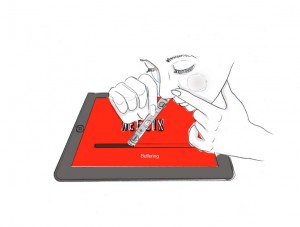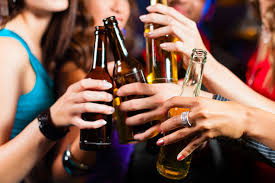As the legalization of marijuana spreads across the country, there has been more evaluation into the drug culture within the United States, specifically that which is associated with partying. There are differing levels of drugs that affect the body in various ways. For example, nobody would say that smoking pot affects you the same way taking a hit of heroin does. There is a large taboo associated with any type of carnal pleasure in the United States, possibly stemming from the puritanical roots from which our nation was founded, but in the modern generation some stigmas associated with a more “risqué” type of life are being lifted.
This begs the question, what are the effects of different drugs on the body? In other words, is experimentation OK?
Let’s build from the ground up with more approachable vices: alcohol and marijuana. Alcohol is considered a depressant and effects the brain by causing sluggishness, a difficulty in speech, and an overall impairment of the brain’s activity, according to nihseniorhealth.gov. Alcohol is ingested and broken down by the liver; whatever can’t be broken down goes straight to the brain where it effects neurotransmitters, specifically GABA, which is where the sluggishness and slowed reaction time comes from (howstuffworks.com). On the other hand, cannabis (more commonly known as pot or marijuana) is considered a hallucinogen. Commonly ingested through smoking, pot can cause an altered state of mind, sluggish movement, and can affect memory (drugabuse.gov). According to LifeHacker, the active component is THC, which affects the dopamine levels in our brains and creates the sense of happiness associated with smoking pot. Both alcohol and marijuana can cause lasting effects if they are used recklessly, but in regards to recreational use in moderation they do not seem to bring about harmful results. These are the most common recreational drugs and can sometimes be considered gateways to other, riskier drugs.
 Within the partying community, the next tier of drugs includes MDMA (commonly known as ecstasy), LSD, and cocaine. These are not as common as the aforementioned, but they make quite an appearance in the more hardcore nightlife scene. I’ll begin with LSD, as it’s one of the most notorious and mythical out of the three. LSD (lysergic acid diethylamide) is in the same class as pot, being a hallucinogen. The most common effects include a distorted sense of reality, specifically affecting the senses, and increases brain activity. There are not a lot of lasting effects associated with LSD, though taking it frequently will cause a buildup of the drug and therefore increase tolerance (imperial.ac.uk). While it can’t be said that LSD is a “safe drug” due to how much it affects and distorts the senses (which can put the user in an unsafe situation), LSD has the possibility to be enjoyed in a safe situation.
Within the partying community, the next tier of drugs includes MDMA (commonly known as ecstasy), LSD, and cocaine. These are not as common as the aforementioned, but they make quite an appearance in the more hardcore nightlife scene. I’ll begin with LSD, as it’s one of the most notorious and mythical out of the three. LSD (lysergic acid diethylamide) is in the same class as pot, being a hallucinogen. The most common effects include a distorted sense of reality, specifically affecting the senses, and increases brain activity. There are not a lot of lasting effects associated with LSD, though taking it frequently will cause a buildup of the drug and therefore increase tolerance (imperial.ac.uk). While it can’t be said that LSD is a “safe drug” due to how much it affects and distorts the senses (which can put the user in an unsafe situation), LSD has the possibility to be enjoyed in a safe situation.
Now we’re going to shift to a drug not as many people are familiar with: MDMA. MDMA is a synthetic drug that combines some hallucinogenic and stimulant properties which primarily affects the serotonin levels in the brain, causing a great sense of happiness and euphoria by affecting the senses. The issue with this synthetic drug is its potential for damaging the serotonin production, which could impair cognitive function according to Mic Network. As opposed to some of the other drugs that have been mentioned, MDMA has the potential for lasting effects on the brain after one use and it usually takes a while to recover from.
To finish up this barrage of facts, I will be discussing cocaine, which is often lumped into the same class as heroine due to its monumental effects on the brain. It is a stimulant typically associated with the wealthy and is often snorted to achieve the desired effect. The danger is the highly addictive nature of the drug, which is higher than those previously mentioned. According to Medical Daily, cocaine typically affects the frontal cortex, specifically dopamine receptors. This creates a sense of happiness, but because cocaine is a short-lived high, the crash results in a depressive state. To achieve a similar high, more of the drug must be taken which is how overdoses occur. In fact, cocaine is one of the leading causes of non-prescription drug related overdose (businessinsider.com).
In the grand scheme of things, I could describe all the various drugs that are associated with a hardcore partying life, but nobody wants to read lists of facts for that long. But throughout constant research and interest in the subject material, any sort of drug that has an influence over the brain should be treated with caution. Some drugs are a lot more dangerous than others, but in a safe environment and with the right people and knowledge experimentation is not as devastating as many people make it out to be. It is key to be wary of signs of addiction and not to use any of the aforementioned substances as an outlet for inner turmoil on a frequent basis.
References:
http://science.howstuffworks.com/life/inside-the-mind/human-brain/alcoholism4.htm
https://nihseniorhealth.gov/alcoholuse/howalcoholaffectsthebody/01.html
https://www.drugabuse.gov/publications/drugfacts/marijuana
http://lifehacker.com/what-marijuana-actually-does-to-your-brain-and-body-1693986467
https://mic.com/articles/137070/the-disturbing-truth-about-how-ecstasy-affects-the-brain#.X9gBWVoFN
http://www3.imperial.ac.uk/newsandeventspggrp/imperialcollege/newssummary/news_11-4-2016-17-21-2
http://uk.businessinsider.com/heroin-vs-opioid-overdose-statistics-2015-7?r=US&IR=T
http://www.medicaldaily.com/your-brain-cocaine-dopamine-buildup-excites-brains-reward-center-what-price-270489

















